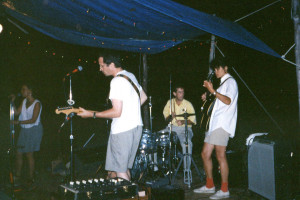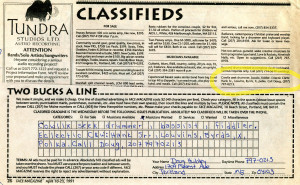Cowlix, Coming and Going
“Je t’aime” by Doug Hubley from “20 Years of a Basement,” Aug. 10, 1991. (“Je t’aime” copyright © 1983 by Douglas L. Hubley. All rights reserved. Visit Hubley Industries Music on Vimeo.)
The summer of 1991 was my 20th anniversary of publicly performing with rock bands, and I wanted to celebrate.
I took a very literal approach to the celebration. It would be a concert featuring not only my current band, the Cowlix, but — I hoped — members of previous bands. I didn’t invite everyone I’d ever played with, but beckoned the most fun and creative people, dating back to 1971 and Truck Farm, my first real band.
Of course, not every invitee could, or wanted to, take part.
So in the event, in addition to the Cowlix, what we wound up with was the Fashion Jungle of late 1984: bassist Steve Chapman; drummer Ken Reynolds; multi-instrumentalist Jim Sullivan, up from the Boston area; and keyboardist Kathren Torraca, who came back East from California. (Ken and I had first played together in the Curley Howard Band (1977), and Jim had joined us in the Mirrors (1979-80), which segued into the FJ in 1981.)
Gretchen and Doug express a basic tenet of their philosophy.
I titled the event “20 Years of a Basement” (pun intentional. And yes, “basement” is a recurring theme in my work, so sue me). We rented Sprague Hall, a popular old community hall under the trees in Cape Elizabeth, for Saturday, Aug. 10, 1991.
What an exciting day. We had grand plans. For the audience we invited everyone we could think of, and many of them even showed. We asked our friend Alden Bodwell to videotape it, with excerpts from the result presented in this post (and on an Archives page here). We worked out a big finale, of Leonard Cohen’s “First We Take Manhattan” and Graham Parker’s “Pouring It All Out,” a signature number from the first bands Ken and I had been in, 14 years prior.
I still dream about setting up masses of musical equipment, walls of amps and drums and miles of cables. I think the elaborate rig we erected in Sprague Hall planted the seed for those dreams. It took most of the afternoon for us to prepare for the evening concert — there the longest were rhythm guitarist and my girlfriend Gretchen Schaefer, singer Marcia Goldenberg, Ken and also Steve, who contributed PA equipment.
Marcia Goldenberg of the Cowlix sings Billy Walker’s hit.
Steve ran the sound for the Cowlix sets, and turned the board over to Cowlix bassist Ted Papadopoulos for the Fashion Jungle numbers, which Steve played on. Steve, in other words, was sharing that responsibility with his replacement in the Cowlix. It was still a bit awkward even though nearly two years had passed since Steve left the band.
But in these chronicles, for whatever that’s worth, Ted is just a footnote. (Sorry Ted!) He was the last in a succession of would-be Cowlix bassists who came and went, lacking the interest, equipment, ability, maturity and/or mental stability, in at least one case, for the connection to click.
The “Québécois Medley” — “You Married My Daughter (But Yet You Didn’t)” and “St. Anne’s Reel” — stayed with the Cowlix from first to last.
Ted was a deejay and musician who relied on gigs for his income, unlike the rest of us dilettantes. Getting scant return from his investment of time with the ‘Lix, he was gone by September. He performed with us only twice, at Sprague Hall and at a barn dance that same month, at the York County home of a colleague of Gretchen’s.
And those two gigs were the Cowlix’ only performances in 1991.
Fiddler/saxophonist Jim Sullivan joined the Cowlix for several numbers, including the best-known country song ever to come out of Maine.
It was quite a contrast from one year to the next. In 1991, two measly jobs. In 1990, we had a recording session, a WMPG-FM spot and at least seven performances, including opening spots for the Sir Douglas Quintet and Bill Monroe — both at Portland’s best-ever night club, Raoul’s.
(The Sir Doug job was very fun. Doug Sahm was a sweet and generous guy, we played well and of course the SDQ, well, there you go! The Monroe date, another story. The bluegrass great was past his prime, his blowhard bus driver bombarded us with bombast, Raoul’s sound guy disliked us and the bluegrass fanatics downright despised us.)
The Cowlix with a song that never made the country charts.
Another 1990 date was a charity event on the beach at Small Point on an August evening. We were on a makeshift stage on the sand, playing rough country music as waves of humid salt air washed over us.
Our one condition for doing the show had been that they give us dinner. This well-heeled crowd really didn’t want to give us dinner. I think we each got a hot dog and they begrudged us that. That’s how you stay rich, I guess.
We opened for Darien Brahms and the Soul Miners in September 1990 at the Drydock, a waterfront bar in Portland. It was pouring rain and the management made us carry our equipment up a fire escape to the second-floor performance room. (This experience inspired my song “1,000 Pounds of Rain.”) We played well, as I recall. The punk dimension of our country sound had coalesced.
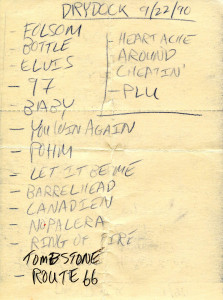
The setlist from the Drydock. Note the paper and marking: By this point we were using “setlist forms,” four-leaf self-duplicating forms that we had scavenged from somewhere. (Hubley Archives)
Our next drummer was in the Dry Dock audience, but we didn’t know that.
“I remember it well for two reasons,” says that musician, Jonathan Nichols-Pethick. “The first was that I was trying to recreate myself as a smoker . . . and was dragging away awkwardly on a Lucky Strike when my good friend Jimmy McGirr, Darien’s bassist, turned to me during the Cowlix’s rendition of ‘(What’s So Funny ‘Bout) Peace, Love, and Understanding’ and said, ‘That’s beautiful eh?’
“I had to agree. The second was that I made a mental note that I wanted to be in that band.”
Which finally came to pass. But how Jonathan came — and went — and then came back to stay, about a year after the Drydock, is another story.
Darien would again ask us to open for her, this time at a Halloween party at the Maine College of Art. All I remember about that is a giant conga line undulating around the room, in the old Portland Public Library building, while Ken, and I on accordion, played . . . I don’t know what. There was no conga-line music in the ‘Lix repertoire.
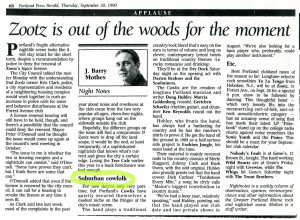
The Cowlix profiled by the Evening Express’ Barry Mothes, 1990. I meant to say, “An additional instrument.” Hubley Archives.
I’m sorry I don’t recall more of that gig, because it was Ken’s last for the next 10 months, although we didn’t know it at the time. And I also don’t remember why he left. Maybe he was just tired of country music, never his favorite genre in any case. And working second and third shifts at the post office was no day at Small Point.
But he returned for “20 Years of a Basement” (and for Shyla and Bill Murray’s barn dance, where we met the fifth member of the 1992–94 Cowlix, fiddler Melinda McCardell).
And how did “20 Years” work out? The weather was sunny and humid for the biggest party we ever threw. I remember Gretchen, Steve, his wife Jeri and probably Ken standing outside the building passing around a bottle of Jack Daniels, the descending August sun shining through the trees.
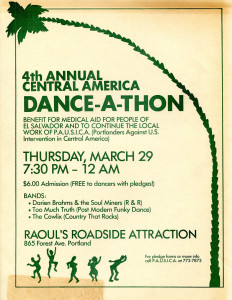
Our first non-open-mic gig in 1990. Between Darien Brahms and the Soul Miners and the worldly electropop of Too Much Truth, where did the garage-country of the Cowlix fit in? (Hubley Archives)
Never one to search for an original idea when there was one worth stealing, I copped Talking Heads’ conceit from the film Stop Making Sense and structured the program such that I would begin with a song, Gretchen would join me for the second number, Marcia would come in next and finally Ken, Ted — and in a special guest appearance Jim Sullivan, on fiddle and mandolin — would complete the set.
We alternated sets with the Fashion Jungle, which also began small (Steve, Ken and Doug) and got bigger. I wore a Col. Sanders tie for the country stuff and one of my skinny neckties for the FJ.
The Cowlix did well — four of the five players were solid while my singing and guitar were somewhat erratic. The reunited FJ, which had time for only a few short rehearsals after years apart, had shaky moments but produced gratifyingly long stretches of our old sound.
There was something of a crowd, including my sisters and father and a strong delegation from the Corner. Some folks wanted to dance. Marcia kept turning the house lights off for the sake of atmosphere — we had no stage lights (us? Lighting? Really? Seriously?) — and Alden kept turning them back on for the sake of the video.
We closed with “Pouring It All Out” (having running out of time for “Manhattan”). We chased our friends out at midnight because the masters of Sprague Hall had strict rules about closing time.
And in the midst of all that, quietly and with barely a thought, we closed the book once and for all on the Fashion Jungle, 10 years after it began.
Watch video of the Fashion Jungle at “20 Years of a Basement.”
Hear (and buy) selections from the Fashion Jungle’s performances:
- Je t’aime (Hubley) Audio extracted from the video at the top of this post:
- Rubber Hammer (Chapman-Hubley-Reynolds) Audio extracted from the video on this page
- Breaker’s Remorse (Hubley) Audio as above.
- Peacetime Hero (Sullivan) Jim sings his composition, written for the original FJ in 1981. Audio as above.
- Sporting Life (Chapman) Audio as above.
- Little Cries (Hubley) Audio from a cassette.
- Curious Attraction (Chapman) Audio from a cassette.
Copyright © by Douglas L. Hubley: “Je t’aime,” 1983; “Breaker’s Remorse,” 2010; “Little Cries,” 1983. All rights reserved.
“Rubber Hammer” copyright © 2013 by Steven Chapman, Douglas Hubley and Kenneth Reynolds. All rights reserved.
Copyright © by Steven Chapman: “Sporting Life,” 1982; “Curious Attraction,” 1984. All rights reserved.
“Peacetime Hero” copyright © 1981 by James Sullivan. All rights reserved.
Notes From a Basement text copyright © 2013 by Douglas L. Hubley. All rights reserved.
